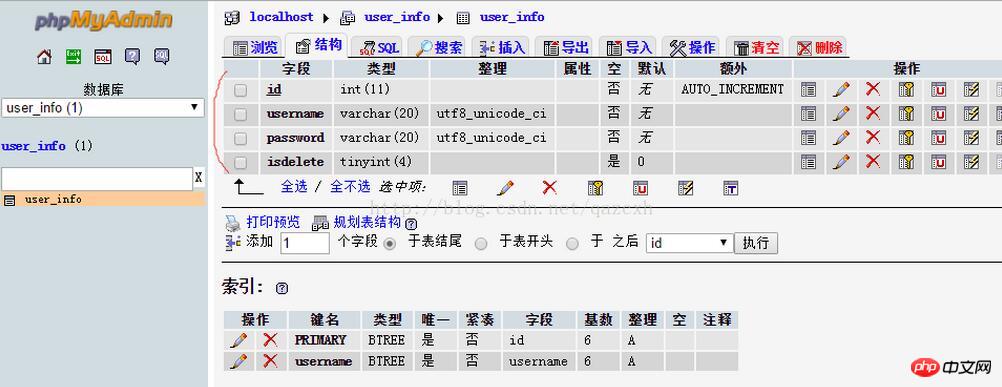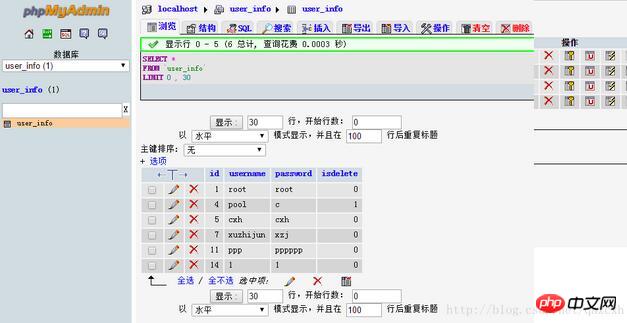
This article mainly introduces php mysql to implement simple login, registration and password modification system in detail. It has certain reference value. Interested friends can refer to
for the connection between php and mysql. There are instructions on many blogs. In order to master the query, modification, insertion and other operations in mysql, this article introduces how to use mysql to create a web page for logging in, registering and changing passwords.
Among them, the following are as follows
1. Login- is to query the content in the database and verify whether the information in the html matches the database Match;
2. Registration- means inserting the content in the database, registering the account and password;
3. Modifying the password- means inserting the content in the database The content is modified.
For these three operations, I used 8 php and html texts to create the details. See the code part
1. The main login interface index.html:
<p>
</p><pre name="code" class="html">
<!DOCTYPE html>
<html>
<head>
<meta charset="UTF-8">
<title>登录注册修改密码系统主页</title>
<style type="text/css">
form {
text-align: center;
}
</style>
</head>
<body>
<form action="enter.php" method="post" onsubmit="return enter()">
用户名<input type="text" name="username" id="username"><br> 密码<input
type="password" name="password" id="password"><br> <input
type="submit" value="登录"> <input type="button"
value="注册" onclick="register();">
</form>
<script type="text/javascript">
function enter()
{
var username=document.getElementById("username").value;//获取form中的用户名
var password=document.getElementById("password").value;
var regex=/^[/s]+$/;//声明一个判断用户名前后是否有空格的正则表达式
if(regex.test(username)||username.length==0)//判定用户名的是否前后有空格或者用户名是否为空
{
alert("用户名格式不对");
return false;
}
if(regex.test(password)||password.length==0)//同上述内容
{
alert("密码格式不对");
return false;
}
return true;
}
function register()
{
window.location.href="register.html";//跳转到注册页面
}
</script>
</body>
</html>2. Login background operation enter.php:
<!doctype html>
<html>
<head>
<meta charset="UTF-8">
<title>登录系统的后台执行过程</title>
</head>
<body>
<?php
session_start();//登录系统开启一个session内容
$username=$_REQUEST["username"];//获取html中的用户名(通过post请求)
$password=$_REQUEST["password"];//获取html中的密码(通过post请求)
$con=mysql_connect("localhost","root","root");//连接mysql 数据库,账户名root ,密码root
if (!$con) {
die('数据库连接失败'.$mysql_error());
}
mysql_select_db("user_info",$con);//use user_info数据库;
$dbusername=null;
$dbpassword=null;
$result=mysql_query("select * from user_info where username ='{$username}' and isdelete =0;");//查出对应用户名的信息,isdelete表示在数据库已被删除的内容
while ($row=mysql_fetch_array($result)) {//while循环将$result中的结果找出来
$dbusername=$row["username"];
$dbpassword=$row["password"];
}
if (is_null($dbusername)) {//用户名在数据库中不存在时跳回index.html界面
?>
<script type="text/javascript">
alert("用户名不存在");
window.location.href="index.html";
</script>
<?php
}
else {
if ($dbpassword!=$password){//当对应密码不对时跳回index.html界面
?>
<script type="text/javascript">
alert("密码错误");
window.location.href="index.html";
</script>
<?php
}
else {
$_SESSION["username"]=$username;
$_SESSION["code"]=mt_rand(0, 100000);//给session附一个随机值,防止用户直接通过调用界面访问welcome.php
?>
<script type="text/javascript">
window.location.href="welcome.php";
</script>
<?php
}
}
mysql_close($con);//关闭数据库连接,如不关闭,下次连接时会出错
?>
</body>
</html>3. Welcome after successful login Interface welcome.php:
<!doctype html>
<html>
<head>
<meta charset="UTF-8">
<title>欢迎登录界面</title>
</head>
<body>
<?php
session_start ();
if (isset ( $_SESSION ["code"] )) {//判断code存不存在,如果不存在,说明异常登录
?>
欢迎登录<?php
echo "${_SESSION["username"]}";//显示登录用户名
?><br>
您的ip:<?php
echo "${_SERVER['REMOTE_ADDR']}";//显示ip
?>
<br>
您的语言:
<?php
echo "${_SERVER['HTTP_ACCEPT_LANGUAGE']}";//使用的语言
?>
<br>
浏览器版本:
<?php
echo "${_SERVER['HTTP_USER_AGENT']}";//浏览器版本信息
?>
<a href="exit.php">退出登录</a>
<?php
} else {//code不存在,调用exit.php 退出登录
?>
<script type="text/javascript">
alert("退出登录");
window.location.href="exit.php";
</script>
<?php
}
?>
<br>
<a href="alter_password.html">修改密码</a>
</body>
</html>4. The main interface for changing the password alter_password.html:
<!DOCTYPE html>
<html>
<head>
<meta charset="UTF-8">
<title>修改密码</title>
<style type="text/css">
form{
text-align: center;
}
</style>
</head>
<body>
<?php
session_start();
?>
<form action="alter_password.php" method="post" onsubmit="return alter()">
用户名<input type="text" name="username" id ="username" /><br/> 旧密码<input
type="password" name="oldpassword" id ="oldpassword"/><br/> 新密码<input
type="password" name="newpassword" id="newpassword"/><br/> 确认新密码<input
type="password" name="assertpassword" id="assertpassword"/><br/> <input
type="submit" value="修改密码" onclick="return alter()">
</form>
<script type="text/javascript">
document.getElementById("username").value="<? php echo "${_SESSION["username"]}";?>"
</script>
<script type="text/javascript">
function alter() {
var username=document.getElementById("username").value;
var oldpassword=document.getElementById("oldpassword").value;
var newpassword=document.getElementById("newpassword").value;
var assertpassword=document.getElementById("assertpassword").value;
var regex=/^[/s]+$/;
if(regex.test(username)||username.length==0){
alert("用户名格式不对");
return false;
}
if(regex.test(oldpassword)||oldpassword.length==0){
alert("密码格式不对");
return false;
}
if(regex.test(newpassword)||newpassword.length==0) {
alert("新密码格式不对");
return false;
}
if (assertpassword != newpassword||assertpassword==0) {
alert("两次密码输入不一致");
return false;
}
return true;
}
</script>
</body>
</html>5. Background operation of changing password alter_password.php:
<!doctype html>
<html>
<head>
<meta charset="UTF-8">
<title>正在修改密码</title>
</head>
<body>
<?php
session_start ();
$username = $_REQUEST ["username"];
$oldpassword = $_REQUEST ["oldpassword"];
$newpassword = $_REQUEST ["newpassword"];
$con = mysql_connect ( "localhost", "root", "root" );
if (! $con) {
die ( '数据库连接失败' . $mysql_error () );
}
mysql_select_db ( "user_info", $con );
$dbusername = null;
$dbpassword = null;
$result = mysql_query ( "select * from user_info where username ='{$username}' and isdelete =0;" );
while ( $row = mysql_fetch_array ( $result ) ) {
$dbusername = $row ["username"];
$dbpassword = $row ["password"];
}
if (is_null ( $dbusername )) {
?>
<script type="text/javascript">
alert("用户名不存在");
window.location.href="alter_password.html";
</script>
<?php
}
if ($oldpassword != $dbpassword) {
?>
<script type="text/javascript">
alert("密码错误");
window.location.href="alter_password.html";
</script>
<?php
}
mysql_query ( "update user_info set password='{$newpassword}' where username='{$username}'" ) or die ( "存入数据库失败" . mysql_error () );//如果上述用户名密码判定不错,则update进数据库中
mysql_close ( $con );
?>
<script type="text/javascript">
alert("密码修改成功");
window.location.href="index.html";
</script>
</body>
</html>6. Main interface for registering an account register.html:
<!doctype html>
<html>
<head>
<meta charset="UTF-8">
<title>注册系统</title>
<style type="text/css">
form {
text-align: center;
}
</style>
</head>
<body>
<form action="register.php" method="post" name="form_register"
onsubmit="return check()">
用户名<input type="text" name="username" id="username"><br>
密码<input type="password" name="password" id="password"><br>
确认密码<input type="password" name="assertpassword" id="assertpassword"><br>
<input type="submit" value="注册">
</form>
<script type="text/javascript">
function check() {
var username=document.getElementById("username").value;
var password=document.getElementById("password").value;
var assertpassword=document.getElementById("assertpassword").value;
var regex=/^[/s]+$/;
if(regex.test(username)||username.length==0){
alert("用户名格式不对");
return false;
}
if(regex.test(password)||password.length==0){
alert("密码格式不对");
return false;
}
if(password!=assertpassword){
alert("两次密码不一致");
return false;
}
}
</script>
</body>
</html>7. Background operation of registering an account register.php:
<!doctype html>
<html>
<head>
<meta charset="UTF-8">
<title>注册用户</title>
</head>
<body>
<?php
session_start();
$username=$_REQUEST["username"];
$password=$_REQUEST["password"];
$con=mysql_connect("localhost","root","root");
if (!$con) {
die('数据库连接失败'.$mysql_error());
}
mysql_select_db("user_info",$con);
$dbusername=null;
$dbpassword=null;
$result=mysql_query("select * from user_info where username ='{$username}' and isdelete =0;");
while ($row=mysql_fetch_array($result)) {
$dbusername=$row["username"];
$dbpassword=$row["password"];
}
if(!is_null($dbusername)){
?>
<script type="text/javascript">
alert("用户已存在");
window.location.href="register.html";
</script>
<?php
}
mysql_query("insert into user_info (username,password) values('{$username}','{$password}')") or die("存入数据库失败".mysql_error()) ;
mysql_close($con);
?>
<script type="text/javascript">
alert("注册成功");
window.location.href="index.html";
</script>
</body>
</html>8. Exit.php operation when logging in illegally:
<!doctype html> <html> <head> <meta charset="UTF-8"> </head> <body> <?php session_start ();//将session销毁时调用destroy session_destroy (); ?> <script type="text/javascript"> window.location.href="index.html"; </script> </body> </html>
9.mysql database construction part


#The above is the entire content of this article, I hope it will be helpful to everyone's study.
Related recommendations:
php Detailed explanation of the usage of json related functions
php Detailed explanation of the usage of mysql_list_dbs() function
The above is the detailed content of php+mysql realizes login, registration and password modification web page. For more information, please follow other related articles on the PHP Chinese website!




